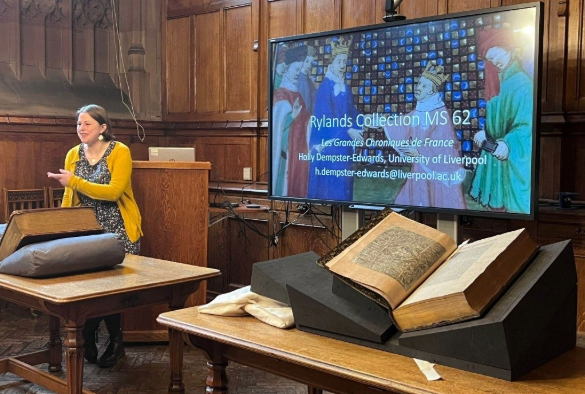Holly Dempster-Edwards is a fourth-year PhD student in French and her research is funded by the AHRC (Arts and Humanities Research Council). Holly was a 2024 finalist at the University’s Three Minute Thesis competition and also received a runner-up prize in the 2024 Liverpool Literary Festival’s short story competition. Alongside her studies, Holly teaches French (and sometimes Spanish!) to undergraduates in the University’s Language Lounge.
How did I become a Historian of Emotions?
I didn’t plan to become a historian! My first degree was in Modern Languages (French and Spanish) at the University of Oxford, and the course had a heavy focus on literature from the medieval period to the modern day. I found myself most inspired by the medieval texts, especially the ones with beautifully illustrated manuscripts, so I completed a Master’s in Medieval Studies at the University of Leeds. I learned a lot about the Crusades and became very interested in medieval understandings of emotions and how they manifest physically.
History feeds into the present day
Think about four things: England sports fans, Richard the Lionheart, George W. Bush, and Duke Philip the Good of Burgundy (one of the most powerful rulers of the Middle Ages). Can you find the connection between them? If you answered crusading, you’re right. The Crusades started nearly 1,000 years ago and were launched by Western Christian states trying to gain control of the Holy Land from Muslim rule. Crusading language and symbols are deeply embedded in our society and are often presented as a positive thing without questioning the reality of the violence involved. George Bush infamously referred to the War on Terror as a crusade following the 9/11 attacks in 2001. Disney chooses to present the warrior King Richard as a cuddly, lovable character, while FIFA warned England fans against dressing as crusaders at the Qatar football world cup in 2022.
Why should we study the Crusades?
The Crusades laid the foundations for the world we know today and my research aims to understand more about the past so we can better understand present-day conflicts. I study emotions in books, specifically in three medieval French texts owned by Duke Philip the Good of Burgundy. There are unfortunately no English versions available but these books include crusading themes. Les Croniques et Conquestes de Charlemaine is a chronicle about the life of the Emperor Charlemagne. La Belle Hélène de Constantinople, and Mabrien are both adventure tales about protagonists who are trying to find their long-lost families while overcoming many challenges including fighting non-Christian enemies.
I chose to study emotions because they’re something that every human being experiences and are a valuable way to help us understand our history. I’m currently researching Duke Philip, who ruled from 1419-1467 and was greatly inspired by the earlier Crusades. Until 1453, Constantinople (Istanbul), the Eastern Christian capital, was ruled by the Emperor Constantine XI of Byzantium, until the Muslim Ottoman Turks invaded. Philip decided to launch a Crusade to try to reinstate Christian rule in the region. To inspire the knights at his court to join the crusade, he threw lavish banquets and had many expensive, beautifully illustrated books produced, with tales of valiant knights from the past who had defeated non-Christian enemies. These books (often read to public audiences) can still tell us a lot about attitudes to the East during this period.
My analysis of the text has so far shown that emotions are used constantly to persuade the audience of how much better the Christians are than their enemies. By using percentages and close literary readings, I’ve identified a bias towards depicting the emotions of male, Christian characters, persuading the audience to identify with those characters who feel the ‘right’ emotions, unlike the enemy characters who are afraid of death or rejoice at Christian losses. ‘Good’ characters love God and hate their enemy, suppress their grief on the battlefield, and find joy in the belief that crusaders will go to Heaven. This propaganda was highly effective, because many knights promised to join Philip on a crusade which never actually happened but was useful for propaganda purposes.
Given all the conflicts we see in the 21st century, understanding the history of the Crusades is more relevant than ever, because attitudes which stem from that period still influence East-West relations to this day. Scholars such as Edward Said (Orientalism, 1978) and Gayatri Chakravorty Spivak (In Other Worlds, 1987) have explored how the West continually treats the East as ‘Other’. Meanwhile, social media platforms and sections of the UK press continue to spread xenophobia by deliberately inciting strong emotions such as fear and hatred. This is a similar strategy to medieval crusading propaganda, by using emotions to create hostility towards outsiders.
There are also more subtle, seemingly innocuous signs of these attitudes which all add up and contribute to xenophobic messages. For example, a video game that glorifies crusaders might affect the attitudes of the player, especially a young person. Often it is precisely because this messaging is so subtle, and often historic, that it can go unchallenged. My research demonstrates how emotions have been used for centuries to provoke conflict deliberately. By developing an adaptable method for examining sources of all kinds, both modern and historic, I hope that my work can help researchers understand the emotional sources of conflicts with a view to working towards resolutions.
